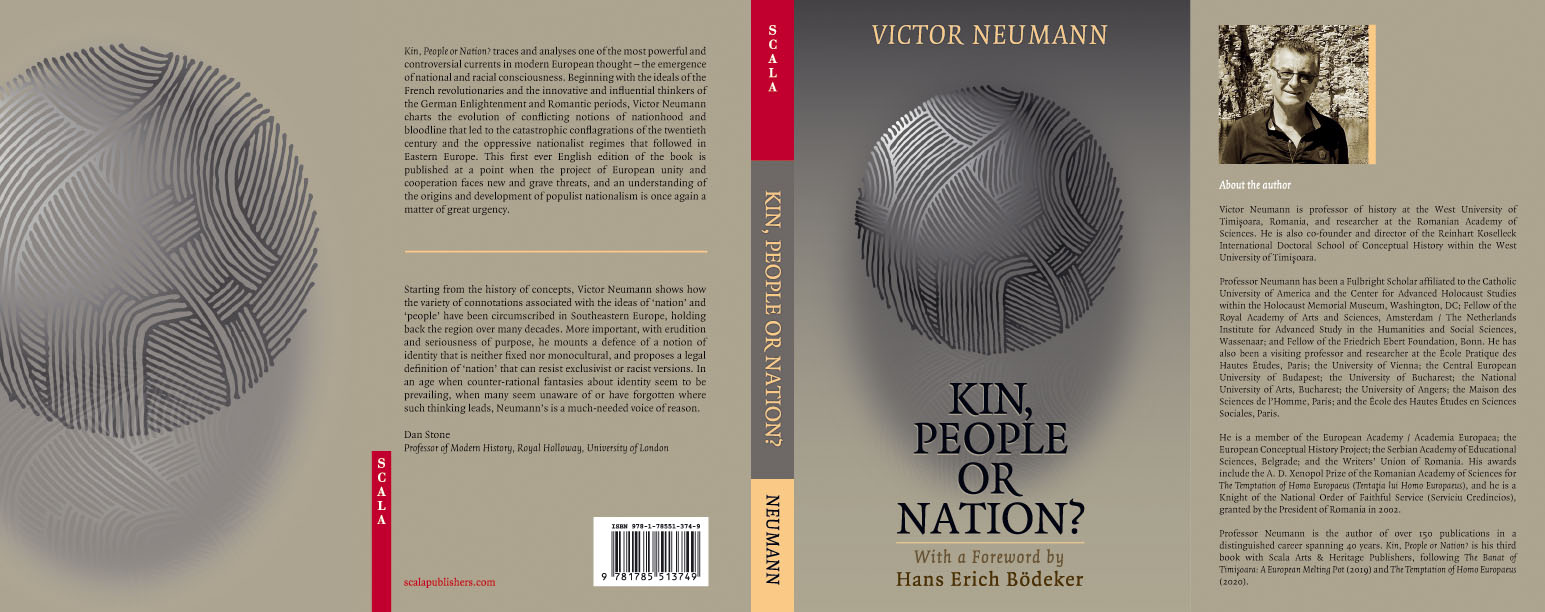Kin, People or Nation? On European Political Identities#
A new publication by Professor Victor Neumann, member of the History and Archaeology section.#
Dan Stone, Professor of Modern History, Royal Holloway, University of London, writes:
Starting from the history of concepts, Victor Neumann shows how the variety of connotations associated with the ideas of 'nation' and 'people' have been circumscribed in south-eastern Europe, holding back the region over many decades. More important, with erudition and seriousness of purpose, he mounts a defence of a notion of identity that is neither fixed nor monocultural, and proposes a legal definition of 'nation' that can resist exclusivist or racist versions. In an age when counter-rational fantasies about identity seem to be prevailing, when many seem unaware of or have forgotten where such thinking leads, Neumann's is a much-needed voice of reason.
Publisher: Scala Arts and Heritage Publishers Ltd
Publication Date: 08/11/2021
ISBN-13: 9781785513749
The book will be discussed in a panel within the International Conference on Conceptual History at the Freie Universität Berlin on 7-9 April 2022.#
Preface by Prof. Neumann:#
When discussing the diverse world of earlier generations it is necessary to bear in mind the limits of the social sciences and submit them to critical and rational analysis. The questions raised in this book attempt to problematise the concept of the nation and reconsider the impact of our diverse cultural heritage and political theories. I have considered the different connotations of the concept of nation, taking into account origins, language, religion, territoriality, administration, legislation and civic identity. Questions regarding individual and group identity are particularly pertinent considering the close correlation between dominant political ideologies and the idea of the nation. The civic nation is not the same as the cultural nation, hence administrational and legal matters are separate from ideas about language and collectivity. The concept of the nation has been omnipresent in social and political discourse over the past two centuries, but we should not ignore the multicultural and intercultural realities of those societies and should acknowledge that their ‘fusion of horizons’ can help us redefine the notion of identity. This is why I argue that European nation states would be advised to renounce some of their sovereignty for the benefit of a transnational federation.
Kin, People or Nation? is a survey of some of the most influential works on history and political philosophy and aims to reveal the significant impact of Romantic and post-Romantic thought on the segregation of Europe and its people on the basis of ethnocultural and national criteria. On the other hand, further research indicates the survival of an opposite idea, that of integration, which illustrates the possibility of transcending cultural and linguistic divides through administrational and legal efforts. The success of this enterprise relies on our familiarisation with past and present multicultural and intercultural realities, as well as the old utopian ideals we have inherited from the most illustrious Renaissance and Enlightenment thinkers whose imagination contrived the first image of modern Europe.5 The importance and even urgency of grasping these realities will be apparent to readers of this new English translation of the book, which is being published at a time when the notion of European integration finds itself under great pressure from the forces of populism in many countries. While the later chapters of this study focus on Eastern Europe and my native Romania in particular, the ideas and the challenges I discuss will resonate strongly with audiences across Europe and beyond.
Read the foreword by Hans Erich Boedeker from the Max Planck Institut fuer Geschichte Goettingen:#
"Against the backdrop of the worrying return and spread of nationalism in the form of strong cultural and political identity, Victor Neumann approaches from a new perspective the unity-diversity relationship within and between cultural and political communities. His study combines historical and systematic moments of analysis of national thinking and arguing in order to problematize the concept of nation.
His historiographical chapters construe the semantic field “nation” - its constitutive moments, effects and supporters - explaining the nation-state in France, the cultural nation in the historic German-speaking regions of the nineteenth century, and in Eastern Europe with a particular focus on twentieth-century Romania. His approach subtly considers the use of the semantic field by distinct speakers in distinct circumstances for distinct purposes.
The systematically oriented chapters build on the critical reconsideration of some remarkable theorists of those categories which had shaped the discussion about the “nation” for a long time such as identity, unity, diversity, ethnicity, culture etc. They, however, turned out to be inadequate for both a plausible analysis of the historical processes under consideration and a conceptualization of the contemporary world, since they presuppose uniform, homogeneous, and closed cultural and political communities. Neumann regards the need to redefine these patterns of analysis as inevitable. His close look at these categories demonstrate that identity is always hybrid, that culture is always heterogeneous and that historical differences are not just exclusive. Cultures unfold, he convincingly argues, in the tension between diversity and what they have in common. According to Neumann, the political and cultural world is characterised by being individual and diverse at the same time.
Neumann's book is a substantial plea for the recognition of the other, of the other's culture, of the other's political community. Reciprocity, however, constitute an essential prerequisite for recognition as a fundamental model for socio-political life. "




